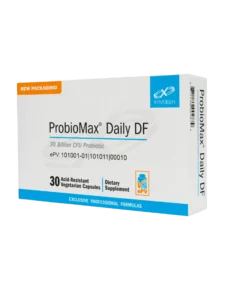What is Candida?
You are probably familiar with the “microbiome,” the good and bad colony of microorganisms living in the gut that not only keeps our digestive health moving but also powers the immune system, defends against pathogens, improves nutrition including production of short-chain fatty acids important in energy metabolism, synthesizes vitamins and fat storage, influences brain health, and more. Among this colony of microorganisms made up of bacteria, viruses, and parasites is also fungi.
The most dominant or abundant fungal species in the human gut is Candida albicans. It is a yeast that is pathogenic, meaning “disease-causing.” In people with compromised immune systems, it can overgrow and invade host tissues, causing oral thrush and vaginal yeast infections. However, Candida albicans resides in all of us, and it doesn’t always cause disease or infection. It is not necessarily the presence of Candida albicans in your body, but the shape that it takes. Candida albicans is a famous fungi for its shapeshifting capabilities. It can undergo a morphological transition from a single-cell budded yeast (like the photo above) to an elongated multicellular “hyphal” form. It is this hyphal form that is more pathogenic. It is better at sticking to host tissues and producing an immune response within the body.
Bacteria usually receive the lion’s share of attention when it comes to the microbiome, as it the main colonizer of your gut, but fungi are just as important in the delicate. Let’s dive into what causes Candida overgrowth, the symptoms associated with it, and what you can do to treat this fungus that is very much among us.
What Causes Candida Overgrowth?
You may know that a high-sugar diet and antibiotics can lead to Candida overgrowth, but there are others. In fact, there many other factors that can invite this “fun guy” to the party in your gut (it’s going to be difficult to keep these puns at bay, but I will try my hardest 😉).
The Most Common Triggers of Candida Overgrowth:
- high-sugar diet
- antibiotics
- chronic stress
- contraceptive (birth control) pill
- heavy metal toxicity
- chemical exposure
- diabetes
Common Symptoms of Candida Overgrowth
Oral thrush, vaginal yeast infections, and even fungal infections on the skin and nails are explicit signs that your body is experiencing an overgrowth of Candida. There are, however, many other signs that you may not associate with yeast.
1. Chronic Fatigue
Do you feel tired ALL the time? Yeast overgrowth can be to blame. The reason that it can produce tiredness is three-fold:
- Yeast Overgrowth Can Affect Nutrient Absorption: Your gut is the place where nutrients are broken down, processed, and absorbed. When your gut is out of balance, absorption is affected. When your body doesn\’t receive the fuel that it needs, it can lead to fatigue. In fact, researchers have noted that Candida overgrowth is associated with deficiencies in important nutrients like essential fatty acids, magnesium, iron, vitamin A, and vitamin B6. Low levels in any of these nutrients, especially magnesium, can lead to tiredness, and in many cases, exhaustion.
- Candida Can Produce Toxic Byproducts: Have you ever experienced a hangover? Well, you can blame acetaldehyde for that. This chemical, along with many others, is produced in the body by Candida. Normally, our liver can process small amounts of this chemical. However, when it overgrows, the liver can become overworked and slow down various processes in your body. In fact, in extreme cases, yeast overgrowth in the gut can actually lead to a condition named Auto Brewery Syndrome in which your gut is actually producing ethanol from all of the fungi in your gut. I really should have left that \”fun-guy\” pun for this point, although he\’s really turning out to be a party pooper. Ok, I don\’t know if I can stop it with the puns.
- Overgrowth Can Compromise Adrenal Function: When your liver is working overtime to process Candida toxins, and your immune system is fighting the Candida itself, your adrenal glands are also affected. Adrenal glands produce hormones that help regulate your metabolism, immune system, blood pressure, response to stress and other essential functions. Over time, this constant fight within your body can deplete the hormonal precursors that are needed to produce crucial hormones like pregnenolone, cortisol, and DHEA. As your levels of these hormones drop, it can start to affect your energy levels, your libido, and much more.
2. Brain Fog:
The acetaldehyde byproduct of yeast overgrowth can also affect your nervous system, inducing brain fog. This is due to the oxygen reduction in red blood cells that are combined with this chemical. If less oxygen is going to your brain, your brain cannot work optimally.
3. Digestive Issues:
Speaking of brains, this symptom is a bit of a no-brainer itself. If your gut microbiome is out of balance, you’re most likely going to experience some digestive distress. When a healthy gut microbiome is overwhelmed by an opportunistic pathogen like Candida albicans, the small and large intestine can also start to function suboptimally.
Digestive issues related to Candida can include:
- Diarrhea
- Gas
- Bloating
- Constipation
- Cramps
- Nausea
New research is suggesting that candida may also be related to severe cases of inflammatory bowel disease, or IBD.
4. Sinus Infections:
This is one of those not so easily guessed symptoms of yeast overgrowth.
Most short-term sinus infections are caused by bacteria. However, many chronic sinus infections may indeed be caused by fungal overgrowth. In fact, a Mayo Clinic study found that 96% of 210 patients with chronic sinusitis were caused by an immune system response to fungus.
And yet, what do most doctors give you to treat a sinus infection? You guessed it. Antibiotics! Not only are antibiotics a big contributor to yeast overgrowth in the first place, but they are basically useless for a fungal infection. Antibiotics can kill much of the “good bacteria” that are working in your body against fungus. So, this cycle can be never-ending in some people.
We’ll discuss treatment below, but if you are suffering from chronic sinus infections, balancing your gut may be a far better solution than antibiotics.
5. Food Sensitivities:
Remember when we discussed compromised nutrient absorption above? Well, your gut’s inability to absorb many of the nutrients it needs to keep your energy up and your immune system working well is due to the intestinal permeability that yeast overgrowth can cause. When the yeast in your gut changes from the single-celled bud to the elongated multicellular hyphal form, it can penetrate the walls of your intestines. This allows food to be passed through the intestinal wall before it is broken down. Your body then recognizes this food as a foreign substance, and it calls on the immune system to attack it. Also known as “Leaky Gut Syndrome,” this intestinal permeability can lead to a sensitivity to the food that has passed through the wall. When you eat this food again, even if the permeability has healed, your body may recognize this particular food as a foreign invader and attack it once again.
6. Joint Pain:
Do you wake up with pain, stiffness, and swelling? Don\’t be so quick to chalk this up to normal signs of aging. Joint pain is not normal and a real indicator that something is wrong in the body. Another chemical byproduct of Candida albicans is uric acid, which can lead to a more serious form of arthritis called gout, but can also cause more general joint pain and stiffness. Long term high levels of uric acid in the body can do significant damage to your tendons and joints.
7. Mood Disorders:
We talk a lot about the Gut/Brain Connection here at Tringali Vibrant Health, and for good reason. A microbiome imbalance can have a big effect on your mood (read Dr. Gandhi’s article on Gut Health and Mood Disorders here).
Candida overgrowth can:
- suppress production of serotonin, one of the neurotransmitters that boost your mood.
- reduce dopamine levels
- lower B12 levels (an important vitamin for your brain and nervous system)
7. A Weak Immune System:
This is another point that probably goes without saying, but I’m highlighting it for the sake of just how important immune function is. I cannot express more emphatically the importance of taking certain supplements for optimal immune function right now. But, if your body is not absorbing these supplements, you may be taking them in vain.
Once again, when it comes to a Candida albicans infection, you can enter into a vicious cycle of cause and effect. A weakened immune system can lead to an overgrowth in the first place. But, Candida can also play a role in the weakening of your immune system.
How to Treat Candida Overgrowth
There are many natural ways to treat localized Candida symptoms, but the most powerful way to treat Candida overgrowth in the body is to optimize your gut microbiome. In fact, your symptoms are very likely to keep coming back until you rebalance your gut.
Restoring balance to your gut and combating Candida overgrowth can be done in three effective and symbiotic ways.
1. Diet
What you put into your body in the way of food and drink has the greatest effect on your gut health. Because Candida needs sugar to survive, a low-sugar diet is pivotal to reducing the growth of this problematic fungus. There are also other things we can eat and avoid to help stave off Candida. In fact, there is an entire diet devoted to combating Candida. Here are a few principles:
- Avoid Sugars (including high-sugar fruits like bananas, pineapple, mangoes, etc.)
- Eat Non-Starchy Vegetables (especially leafy greens!)
- Eat lots of Fermented Foods (kimchi, sauerkraut, kefir, etc.)
- Minimize Caffeine Intake
- Eliminate Gluten (processed flour, pasta, breads)
- Avoid Alcohol (especially beer and wine)
- Drink lots of Water
2. Take A Probiotic!
If you’re not taking a probiotic by now, let this be your sign to begin doing so. There is no better way to balance your gut or support your immune system than taking a good probiotic. Probiotics help to maintain acidity in the gut and repopulate your gut with the “good bacteria” that helps to combat an overgrowth of Candida.
See my favorite probiotics here:
Vibrant Spore IG is a spore-based, broad-spectrum probiotic formula designed to promote a healthy gut microflora and protect mucosal integrity.

ProbioMax® DF is a vegetarian, dairy- and gluten-free, four-strain probiotic totaling 100 billion CFU† per capsule.
2. Antifungals
Lesser known treatments for both Candida albicans and moret general gut health is natural antifungal treatment. These substances help to break down the biofilms that Candida uses to protect itself while working alongside your immune system to reverse overgrowth.
Some Fantastic Natural Antifungals Include:
- Oregano Leaf Extract (numerous studies have reported the efficacy of oregano oil’s ability to fight Candida infections)
- Berberine (has been demonstrated to have a host of powerful therapeutic actions as an antimicrobial agent)
- Garlic Oil
- Caprylic Acid (renowned as one of the strongest Candida killers, and also for restoring normal acidity levels in the gut)
- Undecyclenic Acid
- Betaine HCL
My #1 Favorite Antifungal Treatment for Candida Overgrowth:
CandiKill is formulated to target Candida albicans and other fungal infections. Candida infections can produce various symptoms depending on the area of infection. Once you and your healthcare practitioner have determined that you are suffering from a candida infection, CandiKill can play an important role in reducing this type of infection.
The Bottom Line on Candida
The bottom line on Candida is that we have to keep this fungus at bay within our bodies so that we stave off infection and symptoms. To do this, we have to make a concerted effort to balance our gut microbiota. This means that we consitently work to repopulate the good bacteria while working to restrict the development of bad bacteria. However, it also means that we keep fungi at bay with a low-sugar diet and anti-inflammatory diet, and we combine these efforts with probiotics and antifungal supplements.
If you have any questions, comments, or concerns please feel free to email me at info@tringali-health.com or call us at 561-283-1166.
Elizabeth Tringali, PA-C










